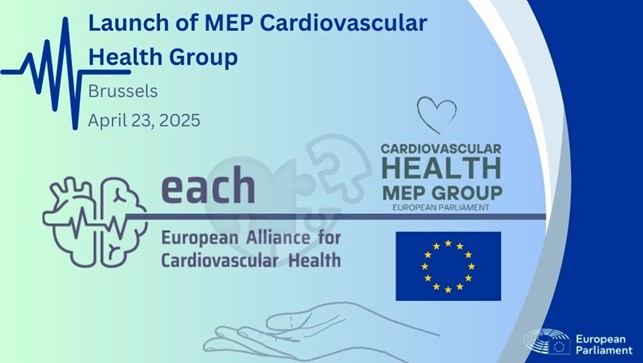
With millions of European citizens affected by heart diseases, the EU is taking a decisive step: promoting heart health and reducing premature deaths from cardiovascular diseases by one-third by 2030.
On April 23, the Cardiovascular Health Group was officially launched at the European Parliament in Brussels. Composed of 16 Members of the European Parliament and supported by the European Alliance for Cardiovascular Health (EACH), the group will lead a new strategy for prevention, innovation, and access to care. Among its first initiatives: the presentation of the European Roadmap for Cardiovascular Health. The EACH Alliance, launched on September 27, 2021, during a high-level political debate on the urgency to strengthen the EU’s commitment to improving cardiovascular care, brought together representatives from the European Commission, Member States, and the European Parliament. Since then, EACH has become a key player in shaping European health policies, with the mission of mobilizing concrete actions to improve cardiovascular health for European citizens.
The Alliance EACH, launched on 27 September 2021 during a high-level policy debate on the urgent need for stronger EU action to improve cardiovascular care, brought together representatives from the European Commission, Member States, and the European Parliament. The debate focused on concrete policy measures to tackle the growing burden of cardiovascular disease across Europe. Since then, EACH has established itself as a major player in shaping EU health policy, with a continued mission to mobilise action and improve cardiovascular health for all EU citizens.
Highlights of the Debate
Last Wednesday, Members of the European Parliament presented cardiovascular diseases (CVDs) as an urgent and growing public health challenge, affecting approximately 60 million people in the EU — a burden made even more pressing in the wake of the COVID-19 pandemic.
The session started with remarks from Romana Jerković, a Croatian MEP from the Social Democratic Party and Chair of the newly formed MEP Group on Cardiovascular Health. She introduced a draft of the group’s 2025 work programme, structured around four key priorities to be implemented across the year:
- Launch Event of the MEP Cardiovascular Health Group
- Informal Policy Exchanges
- Communication Campaigns for World Heart Day and World Stroke Day
- Cardiovascular Health Summit
“When Europeans are sick, Europe becomes weaker”, stated MEP R. Jerković, emphasizing the connection between public health, economic strength, and Europe’s capacity for scientific and technological advancement.
With the goal of building a forward-looking and resilient Europe, the Roadmap sets out an ambitious plan to modernise cardiovascular care and reduce health disparities. Central to this vision is a dedicated research agenda and a strategy for digital transformation. The plan calls for universal access to cardiovascular risk assessments and personalised care pathways for all CVD patients. It places strong emphasis on prevention at every stage—from addressing environmental and social determinants of health to enabling early diagnosis and comprehensive rehabilitation. Among the key EU-level initiatives are the creation of a Cardiovascular Health Knowledge Centre and a Cardiovascular Health Observatory to inform policy through real-world data, along with the rollout of a European Cardiovascular Health Check to identify risks before they escalate.
An essential objective of the Roadmap is to ensure equal access to care, contributing to long-term economic stability —with the potential to reduce healthcare spending, currently estimated at €282 billion annually, and to foster medical innovation.
Beyond medical treatment, the plan also highlights the importance of broader lifestyle factors such as daily physical activity and reducing tobacco and alcohol consumption, especially among young people. The discussion extended to related issues such as mental health and the overall quality of life for both patients and their families.
The debate was marked by a shared sense of urgency and collaboration among MEPs, with calls for stronger prevention, action, and synergy among scientific communities.
Moreover, a personal testimony shared during the debate—recounting a journey with cardiovascular disease starting at the age of four—reinforced the urgent need for increased investment in effective healthcare systems. It underscored the importance of ensuring that all European citizens can access the care they need to lead lives that support both physical and mental well-being.
Both the MEP Group and EACH are advocating for increased investment in cardiovascular research, demonstrating their enthusiasm and commitment to the goals they aim to achieve. We are eager to see how this newly formed group will support heart health for European Union citizens, and how their efforts will contribute to improving long-term healthcare outcomes throughout the EU.
For more information, please visit the following websites:
https://www.cardiovascular-alliance.eu/about/who-we-are/